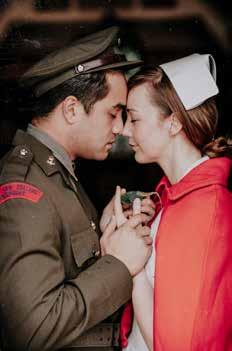
7 minute read
DUNEDIN ROUND UP
ABOVE: Me and My Sister Tell Each Other Everything by Uther Dean, Arcade Theatre Company. Image: Ashley Heydon. LEFT: Ōtepoti Theatre Lab Student Programme, Ōtepoti Theatre Lab in collaboration with Wow! Productions and InterACT Drama Classes. Image: Sarah Georgie.

Advertisement
DUNEDIN
BY JESSICA LATTON
Dunedin Fringe 2020, cancelled due to Covid-19 was due to host a huge number of new works – it continues to support local artists. The Dunedin City Council Professional Theatre Fund, tagged to support the theatre community most affected by the closure of The Fortune Theatre, was a welcome boost to Fringe Artists Grants this year. The New Zealand Young Writers Festival back in October had Nathan Joe as the inaugural Young Writer in Residence, in association with the Robert Lord Cottage. The festival presented readings from his play Scenes From a Yellow Peril, and Zac James' Kangaroo Stew. Zac is the Creative Director of the Yirra Yaakin Theatre Company in Perth, and his engagement with local practitioners went deep. The New Athenaeum Theatre (NAT), a 100seat theatre in the Octagon hosted 61 shows, 236 artists, over 2000 audience members, and over 145 volunteers, July to June. Partnerships with local companies included Prospect Park Productions and Gasp! Inclusive Dance Company. The NAT hit all its targets for inclusion and activity by lockdown. The budget however took a big hit. That’s something NAT is working to recover from. Prospect Park launched the Ōtepoti Writers Lab during the 2019 New Zealand Young Writers Festival. This free initiative for local writers ran sessions through lockdown, fully booked within hours of publicising. The inaugural Ōtepoti Theatre Lab (ŌTL) Playwrights Programme in September paired three playwrights with a dramaturg to develop their short plays over 10 weeks: Kelly Hocking’s Thief! (dramaturg: Emily Duncan), Tableland by Simon Anderson (dramaturg: Simon O’Connor), and Partially Furnished by Isaac Martyn (dramaturg: Duncan Sarkies). In January ŌTL held a scriptwriting workshop at Otago Museum, Diving into Writing. Play:Ground, a three-day festival was to have been delivered at 2020 Dunedin Fringe including Julie Edwards’ new play Te Mauri, Mum and Me. Arcade Theatre Company were awarded the 2019 Production of the Year and Ensemble of the Year at the Dunedin Theatre Awards for their staging of Ionesco's The Bald Soprano. Their 2019 season included Me and My Sister Tell Each Other Everything by Uther Dean and Lemons Lemons Lemons Lemons Lemons by Sam Steiner. Light to Light a local storytelling evening, presented by Abby Howells, at the University Bookshop invites speakers to tell stories from their lives. Dunedin playwright Harrison Kennedy’s Dayboy and a reimagining of Jean-Paul Sartre's No Exit directed by Shaun Swain, postponed due to Covid-19 will be presented in September and October. Wow! Productions produced The Flick, directed by Lara Macgregor, and are currently preparing The End of the Golden Weather directed by Lisa Warrington. The new Dunedin Summer Shakespeare, a pro/am production initiated by Lara Macgregor, Kim Morgan and Jessica Latton presented Romeo and Juliet in Woodhaugh Gardens over February to large audiences of happy picnic-goers. The Shakespeare training for the 2021 season is underway. Finally, Ake Ake Theatre Company is producing the National Māori Theatre Hui at Karitane Marae in November.
Why I wrote the play I wrote
JOHN BROUGHTON on Ngā Puke: The Hills
Over the 30 years since it was penned Ngā Puke has had quite a life of its own. I was asked by Jim Moriarty to write a two-hander play. In so doing I thought the two characters should start off being worlds apart. Angie is female, Pākehā and urban, contrasting with Waru who is male, Māori and rural. The next decision was the background against which the play was to be set. That was easy: the Battle for Crete in World War Two. I was a Commissioned Officer and on a training weekend at Burnham Military Camp we had what was called an “appreciation” of the actual battle, which involved dissecting all aspects of that particular conflict. It left me armed with all the historical facts essential for the credibility of the play. Act One was set on Waru’s farm, ‘Ngā Puke’ on the East Coast. I chose Ngā Puke for the name of the farm and the play as it was the name of a great-grandfather’s farm in Hawkes Bay in the 1800s. I always like to include little personal or extended whānau details in my plays that only I know, or other whānau members may happily recognise. Doing this, I found to my surprise that sometimes things happen quite out of the blue as a consequence – things that tell me that my tupuna are watching over me. This certainly happened with Ngā Puke. Act two was set on Crete. In April 1941 the Allied Forces had retreated to Crete following their withdrawal from Greece due to the German advance. On 30 April command of ‘Creforce’ was entrusted to Major-General Bernard Freyberg, who led the Second New Zealand Expeditionary Force. By the end of April there were more than 42,000 allied soldiers on the island, including 7700 men of the New Zealand Division. The British Seventh General Hospital was set up on Crete to provide medical care for the troops, including the walking wounded. This provided the opportunity for Angie and Waru to meet up again when he walked into the Casualty Clearing Station seeking medical care for his shrapnel wounds. Waru, a young Second Lieutenant with 28th Māori Battalion encountered Angie, a Nursing Officer on duty. However, Freyberg knew that the German invasion was to come as the British had cracked the Enigma Code and thereby could decipher the military codes used by Germany. But Freyberg could do very little with this intelligence as it could mean that the Germans would realise that their codes had been deciphered. But what Freyberg

did do was to evacuate all the fifty Nursing Officers from Crete back to Egypt before the invasion came. This fact was crucial for the unfolding of my plot line for the play Ngā Puke was workshopped in December 1989 at Tapu Te Ranga Marae in Island Bay, Wellington, directed by Alison Quigan with Lisa Warrington as dramaturg. Lisa went on to direct two productions of the play. In 1990 it premiered at Taki Rua/Depot Theatre in Wellington produced by Jim Moriarty’s company, Te Rakau Hua O Te Wao Tapu for a 3-week season as part of the 1990 International Festival of the Arts with Maggie Harper and Toby Mills. In 1992 Jim took Ngā Puke on a national tour of high schools where he played Waru with Jude Gibson as Angie. He said that at one rural high school the students did not want to bother fronting up to some “stink old play” but as soon as the play opened with Waru trying to manage his sheep, he had them all eating out of his hand! The students identified strongly with the play, as most of their grandfathers and great uncles had served in the 28th Māori Battalion. Ngā Puke went on to be a standard text for fifth form Correspondence School for many years. It’s had numerous productions, including recently with Te Pou Theatre in Auckland and Waitī Productions in Rotorua and Dunedin. One amazing thing that occurred was just a week before the 1990 production in Dunedin. I happened to come across a waiata, ‘I Runga o Ngā Puke’ among some old family papers at home. The waiata carried a note saying it was “based on a song which was current in the Rotorua district in the summer of 1914, and later adopted…by Mr P.H. Tomoana of Hastings, the song will long be associated with the Second Māori Contingent…1915.” The song was reset to music and was used in the Dunedin production of the play.
The words were so apt: Waiho mai e tama O kupu oati I runga o nga puke I tangi ai taua. E haere ana koe Ko runga o te pakanga: Ko te reo aroha, Karanga mai.
‘Twas on the mountain Our love was plighted: You vowed to hold me In memory forever. Now war has called you Across the ocean. My heart is breaking, Crying in vain. The tupuna were certainly there for me!
ABOVE: Ngā Puke by John Broughton, Waitī Productions. Image: Michelle Cutelli Photography.









